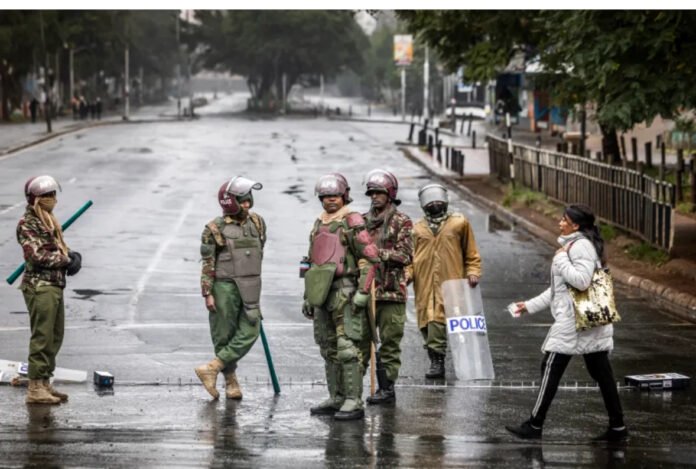
Nationwide rallies to mark the 35th anniversary of a pro-democracy uprising have turned into a wider call for President William Ruto to resign.

Police in Kenya have fired live rounds and water cannon at antigovernment protesters in the capital Nairobi on the 35th anniversary of a pro-democracy uprising, killing two people and injuring several others, a hospital director said.
The two protesters had died from gunshot wounds on Monday at Eagle Nursing Home in a Nairobi suburb, according to the hospital’s director Aaron Shikuku.
Hundreds of people demonstrated in the city earlier on Monday, with some blowing whistles while they marched amid heavy police deployment.
People rally each year on July 7 to mark the date in 1990 when Kenyans demanded a return to multiparty democracy after years of autocratic rule by then-President Daniel arap Moi.
The protest – called “Saba Saba” meaning “seven seven” in Kiswahili because of the date – has turned into a wider call for President William Ruto to resign.
Al Jazeera’s Malcolm Webb, reporting from Nairobi, said police blocked most of the main roads leading to the city centre, adding that protesters were trying to reach there as clashes happened.
He said that clashes were going on in several roads as well as some other parts of Kenya.
“We started receiving reports from several locations of people with gunshot wounds,” Webb said, adding that ambulances headed to the locations where wounded people were.
Similar demonstrations over corruption, police brutality and unexplained disappearances of government critics had descended into violent clashes last month.
Most schools and at least one shopping mall were shut in anticipation of possible trouble.
“We are not ready to go back [home] because who will fight for our rights then? We will be here till evening,” Francis Waswa, a construction worker, told Reuters news agency.
Monday’s event came as young Kenyans are once again engaging in protests that also saw looting and violence, leaving dozens dead and thousands of businesses destroyed.
Protesters accuse the authorities of paying armed vandals to discredit their movement, while the government has compared the demonstrations with an “attempted coup”.
The government is committed to protecting life and property during protests, Interior Minister Kipchumba Murkomen said on his X account on Sunday.
“Our security agencies are on high alert to deal decisively with criminals and other elements of ill intent who may seek to infiltrate peaceful processions to cause havoc, mayhem, or destruction of property,” he said.
Leading activist Hanifa Aden wrote on X: “The police getting rained on as they block every road while we stay at home warming our beds.”
“Total shutdown and forced holiday executed by the state,” she added.
On Sunday afternoon, a news conference by the Kenyan Human Rights Commission calling for an end to “enforced disappearances and extrajudicial killings” was broken up when men, some armed with sticks, forced their way into the compound.
Social media and rising economic expectations have created anger at inequalities in a country where about 80 percent are trapped in informal, poorly paid jobs.
The death of Albert Ojwang, a teacher and blogger, in police custody in June gave impetus to protests, with the government-funded Kenya National Commission on Human Rights reporting 19 deaths across the country during demonstrations last month.
Prosecutors approved murder charges against six people, including three police officers, over Ojwang’s death. All six pleaded not guilty.
At least 80 people have died in protests since June 2024, and dozens have been detained illegally.
Politically, Ruto – elected in 2022 – still holds a strong position, having forged an alliance with the main opposition leader, Raila Odinga, leaving no clear challenger ahead of the next vote in 2027.
SOURCE: AL JAZEERA AND NEWS AGENCIES





